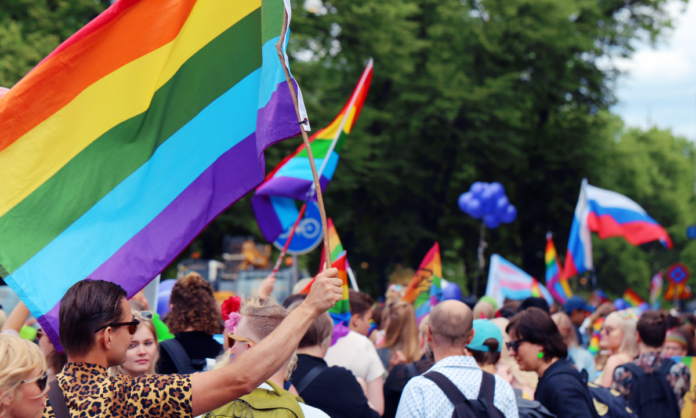 Throughout the summer students, faculty, and staff at the University of Arkansas – Fort Smith will release weekly reading (and watching) lists, centered around amplifying diverse voices, and sharing fulfilling, fun, moving, and monumental stories with the UAFS community.
Throughout the summer students, faculty, and staff at the University of Arkansas – Fort Smith will release weekly reading (and watching) lists, centered around amplifying diverse voices, and sharing fulfilling, fun, moving, and monumental stories with the UAFS community.
For the fourth week of this summer series, the dedicated librarians at the UAFS Boreham Library created a list that celebrates and honors the LGBTQIA+ community and the excitement of Pride Month.
The un-natural state: Arkansas and the queer South by Brock Thompson – Recommended by Jason D. Phillips
The Un-Natural State is a one-of-a-kind study of gay and lesbian life in Arkansas in the twentieth century, a deft weaving together of Arkansas history, dozens of oral histories, and Brock Thompson’s own story. Thompson analyzes the meaning of rural drag shows, including a compelling description of a 1930s seasonal beauty pageant in Wilson, Arkansas, where white men in drag shared the stage with other white men in blackface, a suggestive mingling that went to the core of both racial transgression and sexual disobedience. These small-town entertainments put on in churches and schools emerged decades later in gay bars across the state as a lucrative business practice and a larger means of community expression, while in the same period the state’s sodomy law was rewritten to condemn sexual acts between those of the same sex in language similar to what was once used to denounce interracial sex. Thompson goes on to describe several lesbian communities established in the Ozark Mountains during the sixties and seventies and offers a substantial account of Eureka Springs’s informal status as the “gay capital of the Ozarks.” Through this exploration of identity formation, group articulation, political mobilization, and cultural visibility within the context of historical episodes such as the Second World War, the civil rights movement, and the AIDS epidemic, The Un-Natural State contributes not only to our understanding of gay and lesbian history but also to our understanding of the South.
Cantoras by Carolina De Robertis – Recommended by Melissa Freiley
Five young women, living under dictatorship in Montevideo, Uruguay, in the 1970s—in which homosexuality is punishable by jailing—find each other and build a strong found family that begins with a trip to the miniscule coastal village Cabo Polonio. Some of the women are (or become) lovers, some are (or become) former lovers, but through the 1970s, 1980s, and beyond, Cabo Polonio is their haven; over the years, they visit their tiny hut, sometimes together, sometimes with new lovers, sometimes alone. Full of love, triumph, and heartbreak, De Robertis’s poetic prose evokes the lively and constant ocean that always seems present and “lifts the world” of lesbianism in Uruguay. After reading this work of art, it will be hard not to want to learn more about, or even travel to, Uruguay.
Selected writings of Gertrude Stein edited, with an introduction and notes, by Carl Van Vechten, and with an essay on Gertrude Stein by F. W. Dupee – Recommended by Jordan Ruud
Lesbian icon Gertrude Stein’s work is some of the most cryptic writing to come out of modernism and still feels challenging and beguiling today. Her poetry, via repetition and syntactic subtleties, casts all of language in a new light, while her prose — especially the “autobiography” she wrote on behalf of her partner Alice B. Toklas — explores identity and the nature of the narrative. “No one knowing me knows me.”
Gender queer : a memoir by Maia Kobabe; colors by Phoebe Kobabe – Recommended by Jason D. Phillips
In 2014, Maia Kobabe, who uses e/em/eir pronouns, thought that a comic of reading statistics would be the last autobiographical comic e would ever write. At the time, it was the only thing e felt comfortable with strangers knowing about em. Now, Gender Queer is here. Maia’s intensely cathartic autobiography charts eir journey of self-identity, which includes the mortification and confusion of adolescent crushes, grappling with how to come out to family and society, bonding with friends over erotic gay fanfiction, and facing the trauma and fundamental violation of pap smears. Started as a way to explain to eir family what it means to be nonbinary and asexual, Gender Queer is more than a personal story: it is a useful and touching guide on gender identity–what it means and how to think about it–for advocates, friends, and humans everywhere.
Sordid lives : a black comedy about white trash a Sharyn Lane, Max Civon, Victoria Alonso production in association with Daly-Harris and Davis Classics ; a Del Shores film ; producers, Sharyn Lane, Victoria Alonso, Max Civon, J. Todd Harris; written and directed by Del Shores – Recommended by Jason D. Phillips
In this cult classic comedy from writer-director Del Shores, a gay West Hollywood actor returns home to his small Texas town for his grandmother’s funeral. As he reconnects with the three generations of his dysfunctional family, the hilariously trashy truth of their “sordid lives” is revealed.
Claiming the B in LGBT: illuminating the bisexual narrative edited by Kate Harrad with a foreword by H. Sharif Williams – Recommended by Jason D. Phillips
Even as the broader LGBT community enjoys political and societal advances in North America, the bisexual community still today contends with decades of misinformation stereotyping them as innately indecisive, self-loathing, and untrustworthy. Claiming the B in LGBT strives to give bisexuals a seat at the table. This guidebook to the history and future of the bisexual movement fuses a chronology of bisexual organizing with essays, poems, and articles detailing the lived experiences of bisexual activities struggling against a dominant culture driven by norms of monosexual attraction, compulsory monogamy, and inflexible notions of gender expression and identity. Kate Harrad’s anthology of a thriving identity yearning to realize itself provides a vision of bisexuality that is beyond gay and straight, rather than left to merely occupy the space between.
“You’re in the wrong bathroom!” : and 20 other myths and misconceptions about transgender and gender-nonconforming people by Laura Erickson-Schroth and Laura A. Jacobs. – Recommended by Jason D. Phillips
From Laverne Cox and Caitlyn Jenner to Thomas Beatie (“the pregnant man”) and transgender youth, coverage of trans lives has been exploding–yet so much misinformation persists. Bringing together the medical, social, psychological, and political aspects of being trans in the United States today, “You’re in the Wrong Bathroom!”: And 20 Other Myths About Transgender and Gender-Nonconforming People unpacks the twenty-one most common myths and misconceptions about transgender and gender-nonconforming people. Authors Laura Erickson-Schroth, MD, a psychiatrist, and Laura A. Jacobs, LCSW-R, a psychotherapist, address a range of fallacies: Trans People Are “Trapped in the Wrong Body” You’re Not Really Trans If You Haven’t Had “the Surgery” Trans People Are a Danger to Others, Especially Children Trans People Are Mentally Ill and Therapy Can Change Them Trans People and Feminists Don’t Get Along.
Past weeks of the Summer Reading Series included:
Summer Reading Series Part 3: Juneteenth Ahead of Juneteenth, the oldest nationally celebrated commemoration of the ending of slavery in the United States, UAFS faculty, staff, and students have compiled a reading and watching list full of works that explore, celebrate, and honor the Black experience, and emphasize equality, education, and empowerment.








